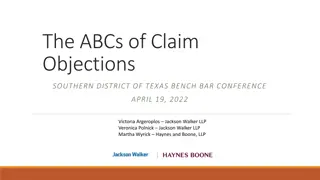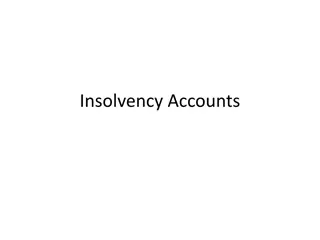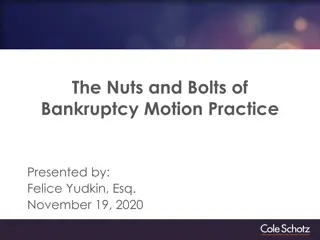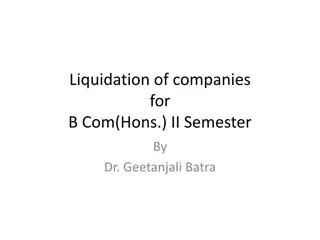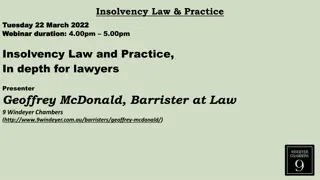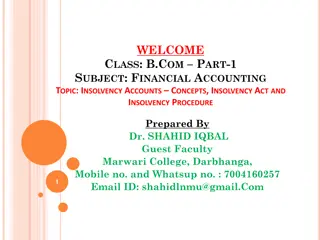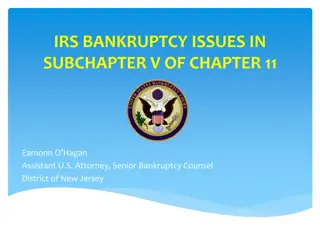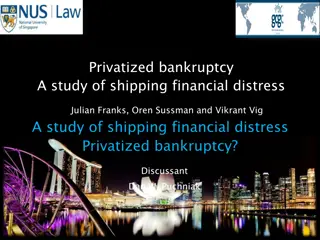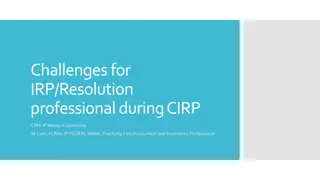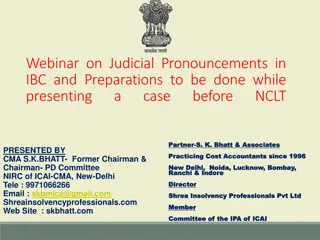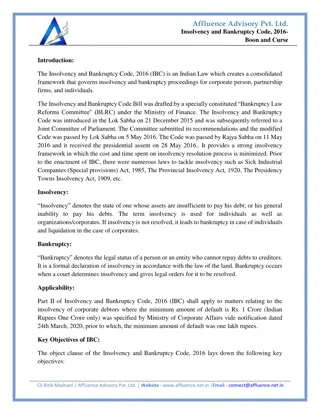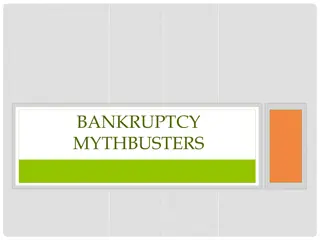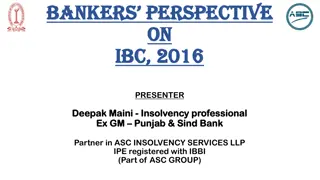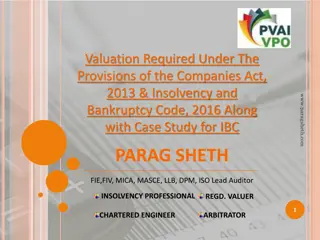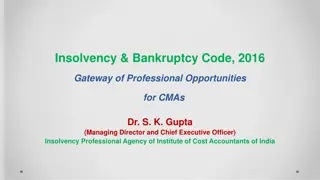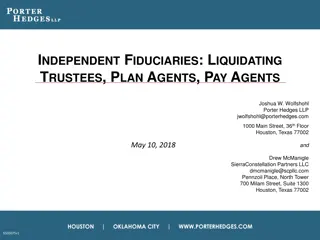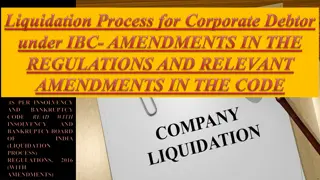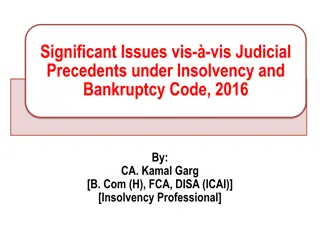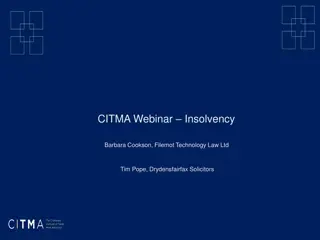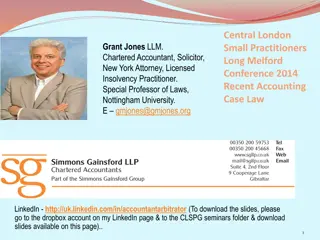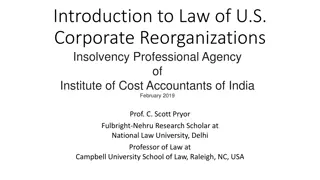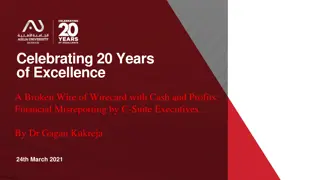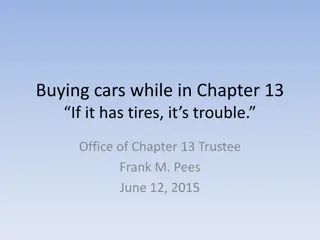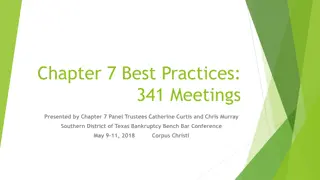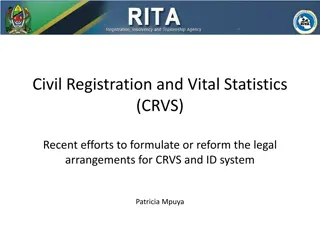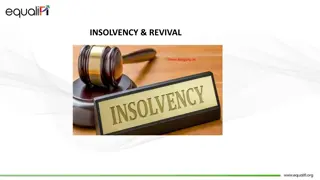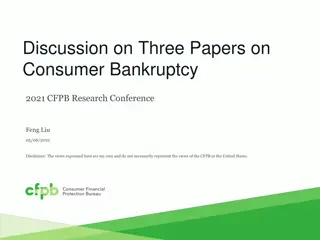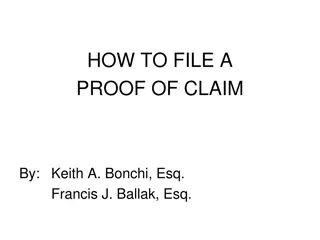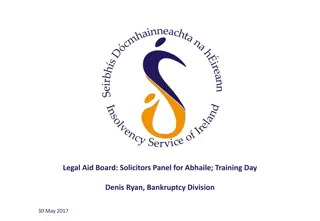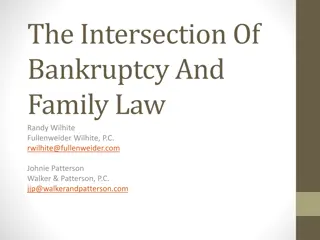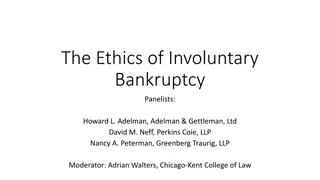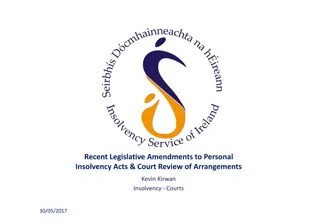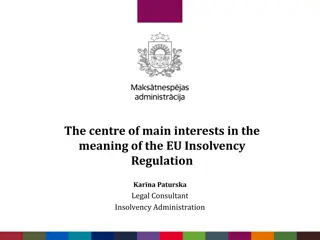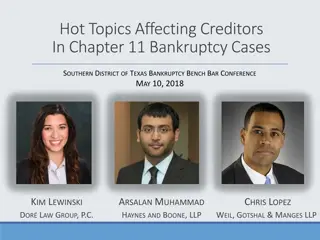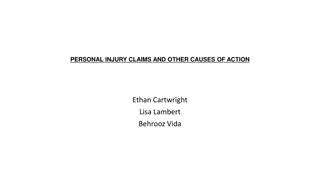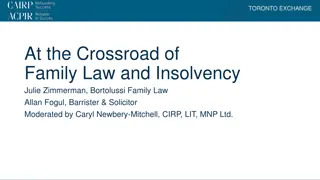Loans for Short-Term Cash Financial Assistance for Various Emergencies
Despite your bad credit history, you can always obtain cash support with short term cash loans. Many lenders are willing to give you the money without requiring credit verification. You therefore have bad credit factors, such as bankruptcy, insolvency, foreclosure, arrears, late payments, CCJs, and
3 views • 1 slides
Understanding Claim Objections in Bankruptcy Proceedings
Explore the essential aspects of claim objections in bankruptcy proceedings, covering the burden of proof, forms of objections, and necessary elements in support of objections. Learn about the duties of debtors in objecting to improper claims and the importance of proper declaration in claim objecti
1 views • 12 slides
Understanding Insolvency Accounts and Laws in India
Insolvency accounts come into play when a debtor is unable to pay debts fully, leading to a legal process supervised by the government for debt resolution. Various scenarios constitute an act of insolvency, such as transferring property to defraud creditors or notifying them of debt payment suspensi
0 views • 38 slides
Bankruptcy Motion Practice Essentials
Dive into the key aspects of bankruptcy motion practice, from contested matters to adversary proceedings. Learn about the rules and guidelines, required documents for motions, and best practices for drafting motions in bankruptcy cases.
0 views • 12 slides
Liquidation of Companies: Procedures as per IBC 2016
The process of liquidating a company involves collecting and selling its assets to pay off debts, with remaining funds distributed to shareholders. Under the Insolvency and Bankruptcy Code (IBC) 2016, specific procedures must be followed, including initiation by either creditors or debtors within se
0 views • 16 slides
Insight into Insolvency Law & Practice: Webinar Overview
Delve into a comprehensive webinar on Insolvency Law and Practice featuring Geoffrey McDonald, a seasoned Barrister at Law. The session covers various aspects including Insolvency and Taxes, Statutory Demands, Winding-up Applications, Liquidations, Insolvent Trading, and more. Discover key statistic
0 views • 58 slides
Understanding Insolvency Accounts and Laws in Financial Accounting
Insolvency in financial accounting refers to the inability to pay debts when they fall due. This article covers the meaning of insolvency, the criteria for being declared insolvent, the Insolvency Act in India, and its applicability to individuals, firms, and Hindu Undivided Families. It distinguish
1 views • 10 slides
IRS Bankruptcy Issues in Subchapter V of Chapter 11 Explained
This content discusses the IRS bankruptcy issues in Subchapter V of Chapter 11, focusing on tax return filing requirements and payment of post-petition taxes under both standard Chapter 11 and Subchapter V. The responsibilities of debtors, trustees, and governmental units, as well as the compliance
2 views • 7 slides
Cross-Border Insolvency: Challenges and Solutions at Ritz-Carlton, Grand Cayman
Explore recent developments and potential reforms in cross-border insolvency at the event held at Ritz-Carlton, Grand Cayman. The program includes discussions on restructuring, obtaining documents abroad, a case study on cross-border insolvency, and more. Learn about practical problems facing direct
1 views • 36 slides
Privatized Bankruptcy in Shipping: Financial Distress Resolution and Industry Comparisons" (75 characters)
This study explores how financial distress in the shipping industry is managed through private institutional arrangements, minimizing economic costs. It compares unique contractual innovations in shipping to traditional corporate bankruptcy processes, highlighting shipping's outlier status and the e
0 views • 18 slides
Challenges Faced by Insolvency Resolution Professionals during Corporate Insolvency Resolution Process
Insolvency Resolution Professionals encounter various challenges during the Corporate Insolvency Resolution Process, such as the need for prompt public announcements, appointing valuers, handling difficult transactions like preferential deals and related party transactions, assessing fraudulent acti
0 views • 8 slides
Webinar on Judicial Pronouncements in IBC and NCLT Case Presentation
This webinar covers judicial pronouncements in Insolvency and Bankruptcy Code (IBC) cases and essential preparations for presenting a case before the National Company Law Tribunal (NCLT). It includes insights and case discussions regarding debt assignment, related party transactions, and disputes ov
0 views • 37 slides
Insolvency and Bankruptcy Code, 2016- Boon and Curse
The Insolvency and Bankruptcy Code (IBC) 2016 provides a unified framework for resolving insolvency in India, aiming to streamline processes, reduce resolution time, and protect creditors. While it enhances financial stability and transparency, chall
0 views • 4 slides
Debunking Bankruptcy Myths: Consumer Insights & Realities
Consumer bankruptcy is defined in the Bankruptcy Code as debt incurred for personal, family, or household purposes, distinct from business debt. This article debunks common myths surrounding bankruptcy, such as its impact on credit, individuals' financial status, and its role in society and the econ
1 views • 14 slides
Challenges Faced by Banks in Adopting IBC
Banks face challenges in adopting the Insolvency and Bankruptcy Code (IBC) due to stringent provisioning norms, additional costs, and complexities in referring cases to the National Company Law Tribunal (NCLT). Secured NPA accounts older than 2 years, unsecured NPA accounts in the second year, and c
0 views • 20 slides
Overview of Valuation Requirements under Companies Act, 2013 & IBC 2016
This text provides insights into the valuation requirements stipulated by the Companies Act, 2013 and the Insolvency and Bankruptcy Code, 2016. It includes sections demanding valuation reports from registered valuers, such as for share capital issues, audit committee terms, director transactions, cr
0 views • 54 slides
Understanding the Insolvency and Bankruptcy Code of 2016 in India
The Insolvency and Bankruptcy Code of 2016 in India replaced various existing laws to streamline the process of corporate restructuring, insolvency, and liquidation. Enacted to resolve bad debts efficiently, attract investors, and strengthen the economy, the code offers benefits like quicker resolut
0 views • 31 slides
Comprehensive Guide to Post-Confirmation Trusts and Plan Agents
Learn about the importance and necessity of post-confirmation trusts and plan agents in bankruptcy cases, the selection process for trustees/fiduciaries, choosing the right post-confirmation vehicle, creating trusts through agreements, and understanding the role of litigation/liquidation trusts in m
0 views • 32 slides
United States Attorney's Office, Southern District of Texas - Helping with Bankruptcy Matters
The United States Attorney's Office in the Southern District of Texas, led by Civil Chief Daniel Hu and AUSA Rick Kincheloe, assists with bankruptcy matters, representing the government in such cases. They work alongside other components of the U.S. Department of Justice, such as the Tax Division, t
0 views • 34 slides
Liquidation Process and Costs under Insolvency and Bankruptcy Code
The process of passing a liquidation order under the Insolvency and Bankruptcy Code is detailed, including scenarios for passing the order and the steps involved in the liquidation process. The costs associated with liquidation, as defined under Section 5 and Regulation 2(ea), cover various expenses
0 views • 28 slides
Key Judicial Precedents on Insolvency and Bankruptcy Code, 2016
Key judicial precedents under the Insolvency and Bankruptcy Code, 2016 are discussed, including rulings on insolvency pleas, distribution of profits during Corporate Insolvency Resolution Process (CIRP), obligations of unrelated parties, the 90-day period for filing claims, and the interaction of mo
1 views • 21 slides
Overview of Insolvency Procedures in Business and Individual Cases
Explore the different insolvency procedures such as bankruptcy, Individual Voluntary Arrangement (IVA), Company Voluntary Arrangement, Compulsory Liquidation, and Creditors Voluntary Liquidation. Understand the key aspects of each process, from initiating petitions to the appointment of IPs and the
0 views • 19 slides
Understanding Director Disqualification and Its Impacts
Directors can become disqualified through personal insolvency or involvement in an insolvent company. Disqualification orders can be imposed by the court under specific circumstances, making the individual unfit to be involved in managing a company. The Insolvency Service plays a key role in investi
2 views • 23 slides
Recent Accounting Case Law: Oraki v. Bramston (2014)
Appeal against Deputy Master Julia Clark's decision on the application to strike out Particulars of Claim and amend it in the case of Oraki and another v. Bramston and another in 2014. The case involves negligence allegations against chartered accountants and licensed insolvency practitioners regard
1 views • 41 slides
Understanding US Corporate Reorganizations and Insolvency Law
Explore the key players in the US bankruptcy system, including bankruptcy judges, Debtors-in-Possession, and Creditors Committee in Chapter 11. Learn about basic bankruptcy concepts such as claims and priority, and the priority scheme outlined in the Bankruptcy Code. Gain insights into the legal obl
1 views • 13 slides
The Wirecard Scandal: Misreporting, Arrests, and Insolvency
Wirecard, a once prominent German technology company, faced a scandal involving financial misreporting, resulting in arrests of top executives and eventual insolvency. Allegations of money laundering surfaced in 2016, leading to investigations and whistleblower reports. In 2020, the company's inabil
0 views • 13 slides
Guidelines for Purchasing Cars During Chapter 13 Bankruptcy
Understanding the considerations and financial implications when buying a car while in Chapter 13 bankruptcy. Exploring factors such as the need for a new vehicle, budgeting, financing options, and realistic car choices. Emphasizing the importance of reliability over luxury during this financial pha
0 views • 36 slides
Importance of 341 Meetings in Bankruptcy Proceedings
The 341 meeting is crucial in bankruptcy proceedings as debtors must appear under oath to answer questions from the trustee and creditors. Failure to prepare can have serious consequences, and important deadlines stem from this meeting, affecting various aspects of the case.
0 views • 29 slides
Reform Efforts in Civil Registration and Vital Statistics System in Tanzania
The Registration Insolvency and Trusteeship Agency (RITA) in Tanzania is responsible for vital event registration, insolvency services, and trusteeship services. The history of birth registration in Tanzania dates back to the colonial era, with separate systems for Mainland Tanzania and Zanzibar. La
0 views • 9 slides
Understanding the Indian Bankruptcy and Insolvency Code (IBC) of 2016
The Indian Bankruptcy and Insolvency Code (IBC) of 2016 was introduced to streamline the resolution process for companies and individuals, aiming to improve recovery rates and ranking in insolvency matters. It consolidated existing laws, creating a time-bound framework to handle insolvency cases eff
0 views • 19 slides
Analysis of Consumer Bankruptcy Research Papers at 2021 CFPB Conference
Explore insights from three papers on consumer bankruptcy, discussing topics such as racial disparities in bankruptcy outcomes, benefits of mortgage principal cramdown, and the role of judges and trustees. The research delves into moral hazards, shadow debt, and the impact of race/ethnicity on bankr
0 views • 18 slides
Steps to File a Proof of Claim in Bankruptcy Proceedings
Learn how to file a proof of claim in bankruptcy cases under different chapters such as Chapter 7, 13, and 11. Understand the types of bankruptcy, timing for filing a proof of claim, and how to prepare the claim accurately. Essential information for legal professionals and individuals involved in ba
0 views • 26 slides
Understanding Bankruptcy Laws and Processes in Ireland
Explore the legal framework surrounding bankruptcy in Ireland, covering the roles of the Official Assignee, consequences of bankruptcy, and the end-to-end process involving debtors, creditors, and the court system. Learn about key laws, regulations, and procedures governing bankruptcy, including ass
0 views • 22 slides
Understanding the Intersection of Bankruptcy and Family Law in Property Identification
Explore the complexities of estate property identification in bankruptcy proceedings and family law, including what is considered as part of the estate, what is excluded, and the determination of property interests under state law. Learn about community property, sole-managed community property, and
0 views • 20 slides
Ethical Considerations in Involuntary Bankruptcy Cases
This content discusses three scenarios involving ethical dilemmas in the context of involuntary bankruptcy filings. From managers filing against fellow LLC members to lenders initiating bankruptcies for strategic reasons, the scenarios highlight complex issues such as creditor solicitation, usury de
0 views • 6 slides
Recent Legislative Amendments to Personal Insolvency Acts & Court Review of Arrangements
The recent legislative amendments to the Personal Insolvency Acts introduced new provisions for court reviews of arrangement proposals, including changes to eligibility thresholds for Debt Relief Notices (DRNs) and increased regulation of Personal Insolvency Practitioners (PIPs). The Court Review un
0 views • 41 slides
Understanding the Centre of Main Interests in EU Insolvency Regulation
Centre of Main Interests (COMI) plays a crucial role in determining the jurisdiction for insolvency proceedings within the EU. This concept, defined by the Regulation 1346/2000, ensures that the debtor's administration of interests is ascertainable and objective, regardless of national legislation.
0 views • 9 slides
Understanding Make-Whole Provisions in Chapter 11 Bankruptcy Cases
Make-whole provisions are contractual clauses allowing borrowers to repay debts before maturity, while requiring payment based on future coupon values. This article explores the purpose, definitions, and examples of make-whole provisions in bankruptcy cases, with specific references to relevant lega
0 views • 32 slides
Duty to Disclose Property of the Estate in Chapter 13 Bankruptcy
Chapter 13 debtors have a legal obligation to disclose all assets, including post-petition causes of action, during bankruptcy proceedings. Failing to disclose such assets can result in detrimental consequences, such as being barred from pursuing claims post-bankruptcy. It is crucial for debtors to
1 views • 15 slides
Understanding Family Law and Insolvency Intersection at CAIRP Exchange Toronto
Exploring the intersection of family law and insolvency, this presentation discusses common issues such as parenting matters, child and spousal support, division of property, and the definition of a spouse. It delves into the nuances of legal terminology, rights, and claims in cases involving bankru
0 views • 51 slides

